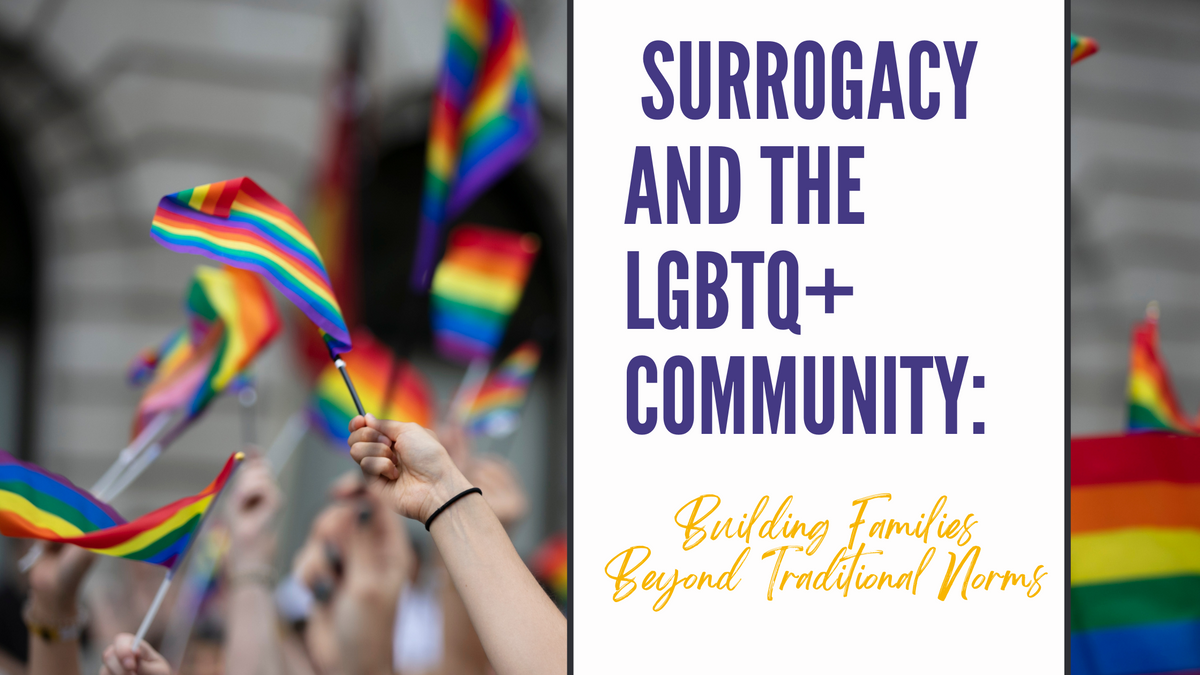With advancements in reproductive technology and a growing acceptance of diverse family structures, LGBTQ+ individuals and couples are increasingly turning to surrogacy to create their families. As an LGTQ+ founded company, we are particularly invested in helping to form families of all kinds via the gift of surrogacy.
Today we explore the evolving relationship between surrogacy and the LGBTQ+ community, how it has expanded family-building possibilities, and what prospective LGBTQ+ parents should know when considering surrogacy.
(Be sure to listen to our podcast with Dr. Guy Ringler, where he shares invaluable insights into the pivotal moments in LGBTQ+ family building!)
The Rise of Surrogacy in the LGBTQ+ Community
Historically, the LGBTQ+ community has faced significant barriers to family-building due to legal, social, and biological limitations. Adoption has long been one of the primary options for LGBTQ+ individuals and couples, but surrogacy offers an opportunity for those who desire a biological connection to their children. Adoption is also not an easy or inexpensive route to parenthood, especially for LGBTQ+ individuals.
Same-sex male couples, transgender individuals, and others within the LGBTQ+ spectrum have increasingly embraced surrogacy as a viable path to parenthood. Gestational surrogacy, where a surrogate carries a baby created from an embryo using the intended parent(s)' or donor's sperm and egg, allows LGBTQ+ parents to have children who are biologically related to them.
How Surrogacy Works for LGBTQ+ Families
Gestational surrogacy involves several key players:
- The intended parents: The individuals or couple who wish to become parents through surrogacy.
- The surrogate (or gestational carrier): A woman who carries the child for the intended parents, but has no genetic relationship to the baby.
- Donors: In cases where one or both intended parents are unable to provide genetic material, egg and/or sperm donors may be used.
TAKE THE SURROGACY QUIZ CHAT WITH A SURROGATE
Legal Considerations for LGBTQ+ Parents
The legal landscape for surrogacy varies widely depending on the country or state. For LGBTQ+ intended parents, it’s crucial to work with surrogacy professionals, such as agencies, fertility clinics, and surrogacy attorneys, who are knowledgeable about both surrogacy laws and the legal protections for LGBTQ+ families.
(Don’t miss our podcast featuring Attorney Amira Hasenbush, where she delves into the legal aspects of LGBTQ+ family building and the vital protections available for ensuring family security!)
Some key legal considerations include:
- Parental rights: In some places, LGBTQ+ parents may face challenges in being recognized as legal parents, especially if only one partner has a biological connection to the child. It’s important to ensure that all parental rights are clearly established.
- Surrogacy contracts: Comprehensive legal contracts protect both the surrogate and the intended parents, outlining responsibilities, compensation, and medical decisions. These contracts are essential for ensuring a smooth surrogacy process.
Working with a surrogacy agency experienced in LGBTQ+ family building can help navigate these complexities and provide support throughout the journey.
Emotional and Social Aspects of LGBTQ+ Surrogacy
Surrogacy offers an exciting opportunity for LGBTQ+ individuals and couples to create families, but it also comes with its own set of emotional and social challenges.
- Community and support: LGBTQ+ parents often seek out communities where they can connect with others who have gone through similar journeys. Many LGBTQ+ surrogacy parents share their experiences and offer support through blogs, social media, and parenting groups.
- Cultural shifts: While society’s views on family have evolved significantly, LGBTQ+ parents may still encounter questions or prejudice regarding their family structure. However, many LGBTQ+ parents find strength and pride in educating others and advocating for their families.
- The surrogate relationship: The bond between surrogates and LGBTQ+ intended parents can be deeply meaningful. Many surrogates feel a strong connection to the families they help create, and this relationship is often a cornerstone of the surrogacy journey.
TAKE THE SURROGACY QUIZ CHAT WITH A SURROGATE
Conclusion: Surrogacy as an Empowering Option for LGBTQ+ Families
For LGBTQ+ individuals and couples, surrogacy is more than just a means to have children—it’s an empowering and affirming choice that breaks away from traditional family-building norms. As surrogacy becomes more accessible and accepted, the LGBTQ+ community can look forward to creating families that reflect their values, identities, and dreams.
Whether you’re just starting your surrogacy journey or looking to learn more about how it works, there are many resources available to guide and support you. Together, we can continue to celebrate the beauty and diversity of families in all their forms.

